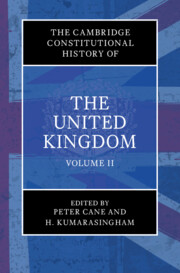Book contents
- The Cambridge Constitutional History of the United Kingdom
- The Cambridge Constitutional History of the United Kingdom
- Copyright page
- Contents
- Contributors
- Editors’ Preface
- 1 The Kingdoms of Anglo-Saxon England (450–1066)
- 2 England after the Conquest
- 3 England in the Thirteenth Century
- 4 England in the Fourteenth Century
- 5 England in the Fifteenth Century
- 6 England in the Sixteenth Century
- 7 The English Constitution in the Seventeenth Century
- 8 A European Perspective
- 9 Wales before Annexation
- 10 The Scottish Constitution before 1707
- 11 The Eighteenth-Century Constitution
- 12 The Constitutional and Parliamentary History of Ireland till the Union
- 13 The United Kingdom in the Nineteenth Century
- 14 The United Kingdom in the Twentieth Century
- 15 The Twenty-First-Century Constitution
- 16 Wales since the Annexation
- 17 Scotland in the Union
- 18 Ireland in the Union
- 19 The Making of Empire
- 20 Constitution and Empire
- Index
10 - The Scottish Constitution before 1707
Published online by Cambridge University Press: 12 August 2023
- The Cambridge Constitutional History of the United Kingdom
- The Cambridge Constitutional History of the United Kingdom
- Copyright page
- Contents
- Contributors
- Editors’ Preface
- 1 The Kingdoms of Anglo-Saxon England (450–1066)
- 2 England after the Conquest
- 3 England in the Thirteenth Century
- 4 England in the Fourteenth Century
- 5 England in the Fifteenth Century
- 6 England in the Sixteenth Century
- 7 The English Constitution in the Seventeenth Century
- 8 A European Perspective
- 9 Wales before Annexation
- 10 The Scottish Constitution before 1707
- 11 The Eighteenth-Century Constitution
- 12 The Constitutional and Parliamentary History of Ireland till the Union
- 13 The United Kingdom in the Nineteenth Century
- 14 The United Kingdom in the Twentieth Century
- 15 The Twenty-First-Century Constitution
- 16 Wales since the Annexation
- 17 Scotland in the Union
- 18 Ireland in the Union
- 19 The Making of Empire
- 20 Constitution and Empire
- Index
Summary
Scottish constitutional history has become a subject of much interest in recent decades. Since the Union came into force in May 1707, Scotland has been one component of a complex and dynamic state. The Union itself has been described as an ‘enigma’ that defies easy or conventional definitions.1 Britain is simultaneously ‘unitary’, in the sense that sovereign power, to this day, rests with the ‘crown-in-parliament’ at Westminster, and ‘pluralistic’, because the Treaty continues to guarantee Scotland (more than Wales and Northern Ireland) considerable autonomy in civil affairs.2 In this respect, the establishment of a Scottish parliament in 1999 is simply the belated democratisation of what has always been a distinct ‘national’ politics. It has also (re)kindled debates on Scotland’s possible constitutional futures and this has included reflection on Scotland’s pre-Union heritage. These debates were aided by the creation of an accessible online edition of the records of the Scottish parliament to 1707.3 The renewed interest in Scottish parliamentary history has complemented endeavours in the field of political thought, where attention has focused on the centrality of kingship to Renaissance and early modern discourses. Certain questions have been thrown into sharper relief as a consequence of these inter-related developments. How did abstracted conceptualisations of the political community inform the ways in which people engaged with its governing and representative institutions? How were the boundaries of legitimate political action negotiated and renegotiated over time? To what principles were political actors expected to conform and what happened when those principles were challenged?
- Type
- Chapter
- Information
- The Cambridge Constitutional History of the United Kingdom , pp. 231 - 258Publisher: Cambridge University PressPrint publication year: 2023



